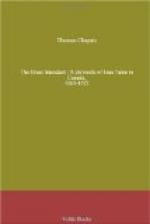In 1667 the Sovereign Council—inspired by Talon—had to discuss a very important question. This was the formation of a company of Canadians to secure the exclusive privilege of trading. By its charter, the West India Company had been granted the commercial monopoly. Under pressure from Talon it had somewhat abated its pretensions and had allowed freedom of trade for a time. But again it was urging its rights. The council asked the intendant to support with his influence at court the plan for a Canadian company, which he did. Colbert did not say no; neither did he seem in a hurry to grant the request. In 1668 the council sent the minister a letter praying for freedom of trade. This year the company had enforced its monopoly and the people had suffered from the lack of necessaries, which could not be found in the company’s stores; moreover, prices were exceedingly high. Such a state of things was detrimental to the colony. The council begged that, if Colbert were not disposed to grant freedom of trade, he would favourably consider the scheme for a trading company composed of Canadians, which had been submitted to him the year before. We shall see, later on, what came of this agitation against the West India Company.
The good understanding between the intendant and the Sovereign Council was absolute. The council had shown unequivocal confidence in Talon’s ability and respect for his person and authority. A few days before the Marquis de Tracy had left the colony the council had ordered that all petitions to enter lawsuits should be presented to the intendant, who should assign them to the council or to the lieutenant civil and criminal, or try them himself, at his discretion. This was treating Talon as the supreme magistrate and acknowledging him as the dispenser of justice. M. de Courcelle, who was beginning to feel some uneasiness at Talon’s great authority and prestige, refused to sign the proceedings of that day, inscribing these lines in the council’s register: ’This decree being against the governor’s authority and the public good, I did not wish to sign it.’ At the beginning of the following year Talon, whose attention perhaps had not been called to Courcelle’s written protest, requested the adoption of a similar decree; and the council did not hesitate to confirm its previous decision, notwithstanding the governor’s former opposition, which he reiterated in the same terms. Courcelle was certainly mistaken in supposing that the council’s decision was an encroachment




